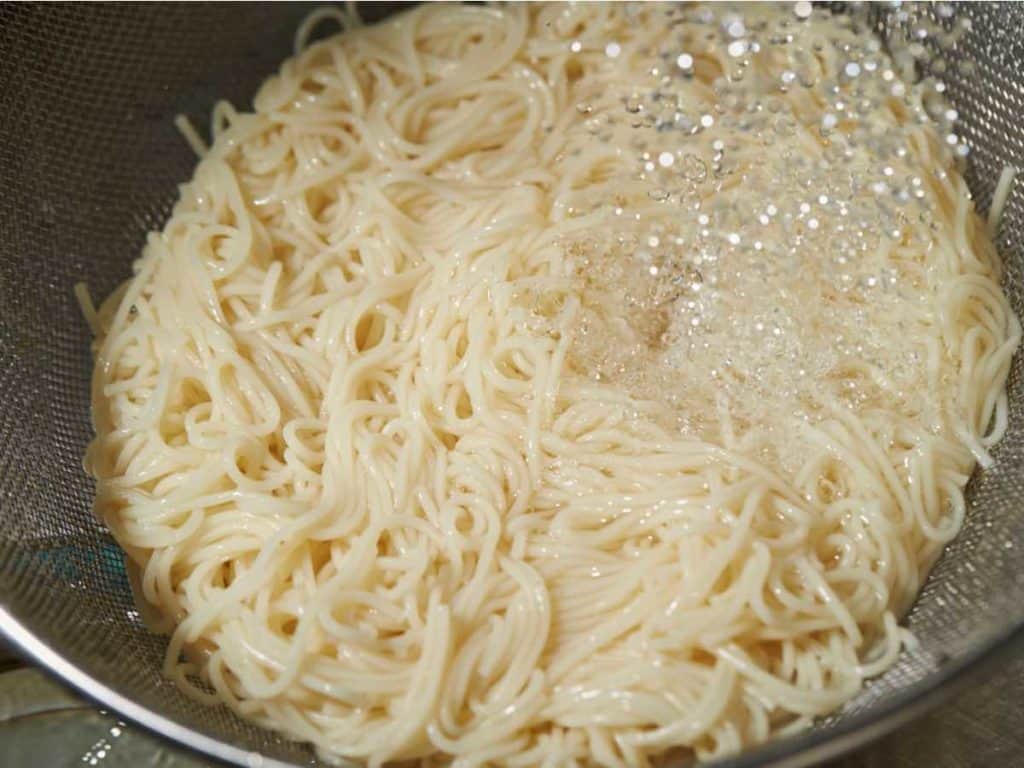How to Store Cooked Noodles To Avoid Contamination
Whether you are into Italian or Asian dishes, your pantry should never be without noodles. Storing uncooked noodles is easy — placing their unopened packaging in a cool, dry place is more than enough.
However, it is a totally different story when it comes to storing cooked noodles as they are prone to getting bad quickly.
Cooked noodles can be stored in the refrigerator from two to five days, depending on the type. Many of them can be stored in the freezer, too, where they can stay for up to two months. Cooked noodles should be placed in an airtight plastic container or a ziploc bag before refrigerating or freezing.
Because they are extremely packed with moisture, it’s a must to store cooked noodles properly.
Otherwise, they may become soggy, which can keep you from enjoying them to the fullest. Cooked noodles may become slimy and moldy as well, which can keep you from enjoying them at all.
Continue reading to know how to store cooked noodles the right way by the type.

How to Store Cooked Egg Noodles
Cooked egg noodles should be stored in the fridge once at room temperature. To keep them from collecting moisture and getting soggy, they should be placed in an airtight plastic container or a Ziploc bag first. Properly stored in the fridge, cooked egg noodles can keep for three to five days.
How to Store Cooked Lasagna Noodles
Cooked lasagna noodles should be allowed to cool to room temperature, placed in an airtight plastic container of a ziploc bag, and then kept in the refrigerator. Doing these steps helps keep them from getting moldy and bad. Properly stored cooked lasagna noodles can stay fresh for up to five days.
How to Store Cooked Pasta Noodles
Because they contain lots of moisture that can encourage mold growth, cooked pasta noodles should be placed in an airtight plastic container or a ziploc bag, and then kept in the fridge. They will keep for three to five days. As much as possible, store cooked pasta noodles and the sauce separately.
How to Store Cooked Spaghetti Noodles
Before refrigerating, cooked spaghetti noodles should be allowed to completely cool and then placed in an airtight plastic container or a ziploc bag. When storing cooked spaghetti noodles, it is a good idea to store them separate from the sauce to keep them from winding up soggy and bloated.
Since spaghetti noodles are some of the most popular types of pasta on the planet, you may be cooking them all the time and thus wanting to ask this pressing question:
How to store cooked spaghetti noodles warm
Warm cooked spaghetti noodles should be stored on a countertop. They should not be placed in a plastic container with a cover as they will collect lots of moisture and wind up mushy. Warm cooked spaghetti noodles may be stored in the oven or microwave to protect them from collecting dust and dirt.
How to Store Cooked Vermicelli Noodles
Similar to spaghetti, cooked vermicelli noodles are best stored just like spaghetti — they should be transferred to an airtight plastic container or a ziploc bag once already at room temperature. Afterward, they should be placed in the refrigerator where they can stay unharmed for up to five days.
How to Store Cooked Rice Noodles
Room temperature cooked rice noodles should be kept in an airtight plastic container or a ziploc bag before refrigerating them. Proper storage lets them stay fresh for three to four days. Unlike some noodles, cooked rice noodles can be stored in the freezer where it will keep for up to two months.
How to Store Cooked Cellophane Noodles
Cooked cellophane noodles, which are also sometimes called glass noodles, should be cooled, placed in an airtight plastic container or a ziploc bag, and then kept in the fridge for three to five days. To keep them in excellent shape for up to two months, they should be stored in the freezer instead.
How to Store Cooked Macaroni Noodles
Cooked macaroni noodles should be allowed to cool to room temperature completely before they are refrigerated in an airtight plastic container or a ziploc bag. Stored in the freezer, they can last for two to three months. Cooked macaroni noodles are best refrigerated or frozen without the sauce.
How to Store Cooked Pho Noodles
To keep cooked pho noodles for up to three to five days, transfer them to an airtight plastic container or a ziploc bag once cool. Place them in the refrigerator afterward. To extend the shelf life of cooked pho noodles to up to two long months, they should be stored in the freezer instead.
How to Store Cooked Ramen Noodles
Cooked ramen noodles can keep for up to five days in the refrigerator, especially if they are allowed to cool and then transferred to an airtight plastic container or a ziploc bag. When refrigerated with the broth, cooked ramen noodles can keep from up to five days, but the quality may decrease.
How to Store Cooked Shirataki Noodles
Also called miracle noodles or konjac noodles, cooked shirataki noodles should be stored refrigerated once at room temperature. Placed in an airtight plastic container or a ziploc bag, they can keep in the fridge for around a week. Cooked shirataki noodles can keep up to two months in the freezer.
How to Store Cooked Soba Noodles
Like many noodles, cooked soba noodles are best stored in the refrigerator, where they can keep for up to five days. They should be placed in an airtight plastic container or a ziploc bag. Before placing cooked soba noodles in the fridge, they have to be drained well to keep them from getting soggy.
How to Store Cooked Somen Noodles
To store cooked somen noodles, place them in an airtight plastic container or a ziploc bag. Put the plastic container or bag in the coldest area in the refrigerator to keep them in tip-top shape for five days. What’s nice about somen noodles is that they can be served cold, especially in summer.
How to Store Cooked Zucchini Noodles
Because zucchini noodles are not really noodles, they need to be stored differently. They should be placed in an airtight plastic container lined with kitchen paper. This is done to absorb excess water, keeping the noodles from getting too wet. Zucchini noodles keep in the fridge for three days.
How to Store Cooked Noodles With Olive Oil
To store cooked noodles with olive oil, transfer them to an airtight plastic container or ziploc bag, and then place in the refrigerator. What’s so great about cooked noodles with olive oil is that the oil helps protect the noodles from excess moisture, which is why they can keep for up to a week.
How to Store Cooked Noodles Overnight
It is best to store cooked noodles in the refrigerator even if they will be consumed the following day. Before placing them in the fridge, they have to be first cooled to room temperature and then transferred to an airtight plastic container or ziploc bag. The next day, pour hot water on them.
Just Before You Store Cooked Noodles
Different noodles may be out of different ingredients and used for different purposes. However, when it comes to storing them, particularly when cooked, they basically require the same things.
Because they contain lots of moisture, it is easy for them to go soggy and moldy.
This is why cooked noodles have to be stored in an airtight plastic container or a Ziploc bag and then placed in the refrigerator.
The majority of them can stay fresh for up to five days. Many can be stored in the freezer where they can keep for up to two months.
Never place cooked noodles in an airtight plastic container or a ziploc bag while they are still hot. Otherwise, the trapped moisture can make them soaking wet, which can keep them from being a delight to eat.
Related Questions
How long do uncooked noodles keep?
Uncooked noodles can last for one to two years past the best-by date, provided that they are unopened and stored in a cool, dry place. Transfer uncooked pasta to an airtight plastic container if the packaging has been opened, and store in the pantry or cupboard.
What are the signs that cooked noodles have gone bad?
Cooked noodles that are no longer fit for consumption are slimy and gooey. They may or may not have signs of molding. Cooked noodles that have gone bad have an unfavorable smell, and they usually have a grayish or whitish color, too.
![How to Store Pizza [Freeze, Thaw, Seal, etc]](https://foodwine.com/wp-content/uploads/pizza-794244712-768x576.jpg)




